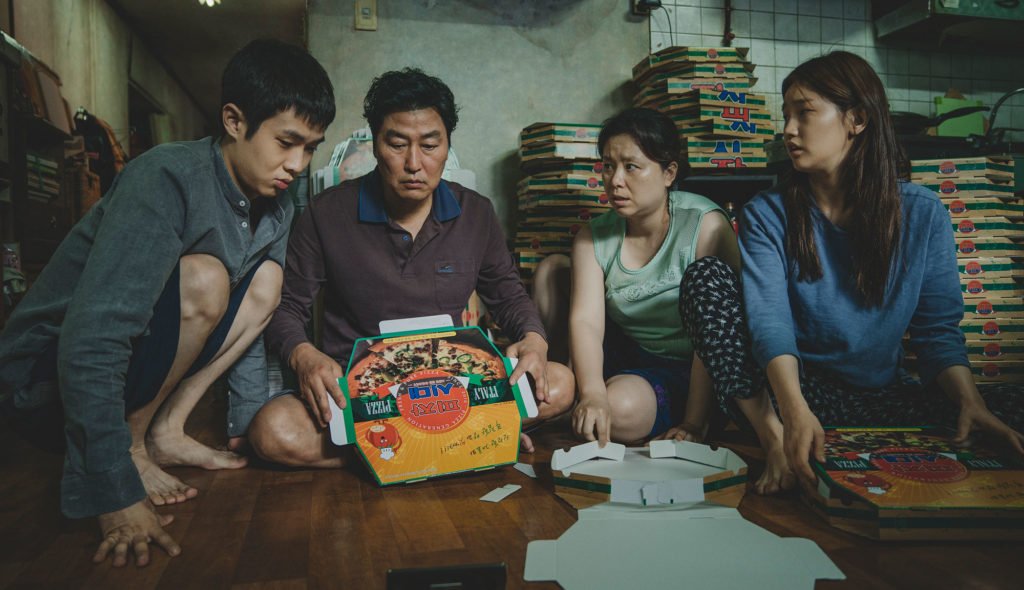Parasite: A Socio-Commentary On Class Tension and Social Death

Parasite, under Bong Joon-Ho’s direction, is one of the first non-English films to ever win Best Picture in the Academy Awards. This film sets the stage for another Asian film in the international backdrop of the film industry. Focusing on creating satiric commentary on capitalism’s realities.
The Film
The satiric film takes place in two major settings which represent its two main themes, a halfway underground apartment and the almost zero-income family. The Kims live folding pizza boxes to make ends meet. While on the other side of the social hierarchy, are the Parks, in their modernist mansion. Their biggest problem is not knowing which of their luxury cars to use for the day.
“No, being low is scary but what I fear the most is that it can get lower than this”
-Parasite, 2019
The film’s plot takes off by displaying the series of schemes and deliberate traps laid by the Kims to trick the Parks into hiring them in their household. They successfully intertwine the fate of the two different families. The film’s progression attempts to capture in a whimsical manner the social predicaments of class segregation within the realms of capitalism.
The intricate display of metaphors upon metaphors is depicted in the film’s realism. The use of foreshadowing and creative framings effectively communicates the symbolism of the film to the audience.

One of the biggest successes of the film is making audiences know that there are symbolic “bread crumbs” to look out for while watching the film. This makes the movie indirectly interactive, like being part of a treasure hunt, and gathering clues and sub-texts. However, instead of the actual treasure, you get to see the lies of capitalism. Discovering efforts to instigate class stratification amongst the working class revealed at the end.
Death By Capitalism
The movie made some scathing observations and stabs at capitalism. More than that it also shows hypocrisy in the manner in which the hidden socialist commentaries are presented.
These satiric films of scathing commentaries reveal the injustices suffered by the poor at the hands of the rich. Then they profit off the movie they have made- it cannot get any more ironic than that. So in other words, after noting the horrors of capitalism on the poor, the filmmakers then proceeded to capitalize on their social lamentations. In order to gain fame and profit.
Given these facts, there is an urge to question, how many more members of the lower class should suffer social deaths before we put an end to this tedious cycle of abuse and oppression?
When we are all actually dead?
No. I don’t think so; the imperative of the film is to make us realize that the only reason why capitalists are rich is that we are poor.
Without the intentional abuse of our labor and services, of our lands, culture, and government, these capitalists would not be situated in the seats of power that they are in.
The Call for Reform
We have been controlled- time and time and again. Told that we’re weak and powerless in this society that operates on currency, well we are not. This society operates on our labor and we have to get back the societal controls that capitalist has monopolized.
Everything else in between that is mere background noise. The lower members of the society should only deeply examine their purposes and contextualize them for the betterment of many. Maybe, then no one would ever suffer death by capitalism ever again.
Rather it would be us bringing death to capitalism.
Precious' only desire for the future is to be more human. The world we live in has shackled us in the limitations of practicality that we are taught that to be human is to be weak. She wants to change that narrative and attempt to prove that the best way to progress and equality is by amplifying our humanity. Believe it or not- she absurdly believes that this could be done through writing. On a more formal and boring note she has a journalism degree with plans to pursue legal studies in the future.






